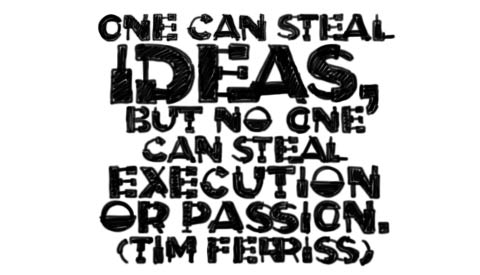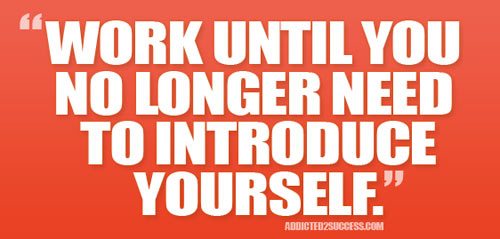It’s my honor to share with you Part 2 of successful habits I learned working for two billionaires:
1) Recognize the Value of Simple Ideas
Oprah, Enver, and most of the world’s billionaires got rich not from a complex idea, but from a very simple one. Sure, there are several who do something technical – like create complex hedge funds. But most billionaires figure out how to take something we all like to do, simplify it, and bring more value to the bottom line. So, next time someone asks you to invest in a lemonade stand, don’t dismiss it so easily :-).
2) Be Patiently Impatient
Billionaires realize nothing happens overnight. As a matter of fact, it takes most billionaires decades to become successful. While patience is used for their long-term goals, I’ve witnessed deadlines for day-to-day, short-term goals articulated by my former bosses as “due yesterday.” Being nimble and having the ability to deliver faster than your competitors is what often makes the difference between success and failure. . Think about Oprah often beating a competing TV network to a coveted interview, or Enver launching a school in a country before anyone else. Don’t play with time.
3) Be Gritty
Ask any 10 people to describe Oprah and Enver, and I bet words like “tenacious” and “relentless” top the lists. Billionaires don’t let obstacles or pitfalls keep them from achieving their goals. Just because you fail 100 times, doesn’t mean you can’t succeed on the 101st try . The key is not just having the stomach for failure, but having the strength to face what feels like an endless amount of resistance… and still move forward.
4) Develop Great Oratory Skills
I’ve never seen better live speakers than my previous bosses. Coincidence? I think not. If you can’t articulate your ideas and your vision (in a compelling way) you can’t galvanize the support required to make things happen. This concept was underscored in a recent interview I did with one of the word’s leading public speaking experts, Marshawn Evans. She stated, “the more effectively you speak, the higher your chances of career success.”
5) Grow Thick, Armor-Plated Skin
The higher your heights, the greater number of detractors you will have AND the sharper their attacks will be.This is a basic truth for everyone, but literally watching thousands of people hurl insults at my bosses (without impact) made me realize they possessed an extraordinary layer of emotional resilience. I recall when we filmed the opening scene of Lovetown U.S.A. (and Oprah arrives on a Naval vessel), while thousands cheered, hundreds complained (and ridiculed) her for wasting tax dollars by using a military vehicle. Developing a “shield” is critical . First Lady Michelle Obama said it best: “never let what somebody else says distract you from your goals. And so, when I hear about negative and false attacks, I really don’t invest any energy in them, because I know who I am.”
6) Connect with People Outside Your Community
Your ability to be of influence within your community is directly related to your ability to make connections outside of your community. The technical phrase for this is called “bridging structural holes,” and is eloquently written about in this research by professor Ronald Burt. Both Oprah and Enver possess tremendous bridging capital. They spend a disproportionate amount of their time gathering information from communities of people outside of their core (different age groups, different social class, different ethnicity, different education levels, different careers, etc) and then they share that information within their community. This is where their ability to influence and have power comes from.
7) Over-Communicate Your Message
It’s not just about speaking loudly, it’s about speaking often. I learned this from my favorite professor at the illustrious McDonough School of Business (shout out: Hoya Saxas!). He floated this concept in class one day and it stuck with me. Don’t make people guess or assume, make sure your community understands your message, precisely. Given the abundance of content produced in today’s world, this concept has taken on even more relevance (Note: more content is published in 48-hours now than was published from the beginning of time until 2003. Amazing, right?!). Watch Oprah or Enver closely when they speak for a short or extended period of time. Their format is always the same. They begin by: telling you what they’re going to tell you, then they tell you, then they summarize by telling you what you just heard. We live in a noisy landscape and repetition, repetition, repetition is necessary.
8) Learn to Laugh at Yourself
Most of us know from experience that having a sense of humor about things can make life a little easier. And, there’s science to back that up: being able to laugh at yourself may be a sign of an optimistic personality and it might even improve your mood. Humor has also been identified as a possible factor in the development of personal resilience. “If you can laugh at yourself, you can forgive yourself,” says Rev. Susan Sparks. “And if you can forgive yourself, you can forgive others.” You can’t go more than 2 minutes in a conversation with either Oprah or Enver without them smiling and belting out a laugh (typically at their expense).
9) Be Great at One Thing, First
By focusing on one passion or strength, you can actually be more innovative. The deeper understanding you gain by doing one thing opens up creative new ideas. Ironically, limitations can lead to liberation. As I mentioned in Part 1, billionaires like Oprah and Enver aren’t necessarily great at many things, but they’re damn good at (at least) one.
10) Know a Higher Power
Developing a relationship with a Higher Power will provide you with guidance for making decisions and solving problems. When you connect with a higher power, you can draw upon greater wisdom to help you resolve your problems. I find it fascinating in my analysis of Oprah and Enver, that while they practice different religions, they possess an unwavering faith. I believe that faith is why they strive to have a positive impact on people and society, value integrity and hold high ethical standards for themselves and their organizations.
I sincerely hope Parts 1 and 2 of 20 Successful Habits have helped and will continue to help you blaze your own trail of accomplishments. Putting these things to work in my life has yielded not only more success than I ever dreamed, but more happiness and fulfillment, as well. If you’re ready to learn even more about making your dreams a reality, read this. And remember, dreams don’t work unless you do!
Source






